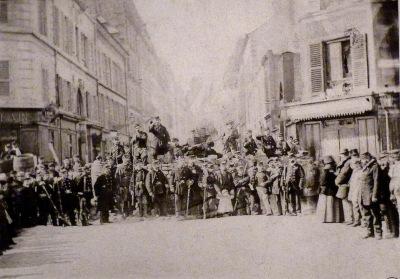The Paris Commune and Alterglobalism
Certainly, the Commune ended with a ferocious and bloody repression; but with all that it revealed, invented, projected, it revealed new possibilities on the paths of emancipation.
- Análisis

The Paris Commune is a universal moment. We rediscover each time its significance in relation to the new questions that arise in building the future.
A specific event of extraordinary density
Obviously, one must take into account the particular situation of France and Paris in 1870, to recall the history of this event and its particular specific gravity. The Paris Commune was an extraordinary insurrection of the people of Paris. It lasted only 72 days, from March 18 to May 21, 1871, and was ferociously repressed during the bloody week of May 21 to 28, 1871. The causes of the Commune are both social and political. The Parisian working classes, workers, craftsmen and small shopkeepers lived in very difficult conditions; poverty was often extreme and working hours were around eleven hours a day. The political situation was dramatic. The Second Empire of Napoleon III collapsed following the defeat in the war against Prussia and the German Empire was proclaimed in Versailles on January 18, 1871. The Parisian population, which had suffered a very hard siege since September 1870, did not accept the capitulation. It enrolled massively in the National Guard and elected its officers. At the same time the newly elected National Assembly, with a monarchist majority, and the government, led by Thiers, fled Paris, which for them was "the capital of the revolutionary idea". They settled in Versailles and made an agreement with Bismarck to crush the insurrection.
Continue reading below….
Del mismo autor
- The Paris Commune and Alterglobalism 28/04/2021
- L’actualité de La Commune de Paris et l’altermondialisme 28/04/2021
- Quels sont les enjeux du FSM 2021 par rapport à la situation mondiale ? 22/01/2021
- What are the challenges of WSF 2021 in relation to the global situation? 22/01/2021
- Some considerations for the debate on the renewal of the World Social Forum 09/12/2020
- Quelques réflexions pour le débat sur le renouvellement du Forum Social Mondial 09/12/2020
- Quelques réflexions sur la pandémie et la mondialisation 06/04/2020
- Some reflections on the pandemia and globalization 06/04/2020
- La bataille de Grèce, un épisode d’une guerre mondiale prolongée 01/09/2015
- Le paradigme écologique et le politique 22/05/2014
Debate izquierdas
- Umberto Mazzei 06/09/2021
- Umberto Mazzei 06/09/2021
- Sergio Rodríguez Gelfenstein 17/06/2021
- Andrés Kogan Valderrama 17/06/2021
- María José Olguín 11/05/2021








